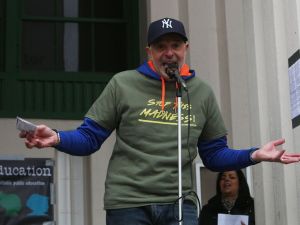CHANCELLOR TISCH: DO YOU EXPECT ANYONE TO TAKE YOU SERIOUSLY ANY MORE?

Please ” Stop This Madness!”
This morning I read two different points of view about teachers. One was Diane Ravitch’s look at a Pasi Sahlberg, the great Finnish educator’s, piece about how Finnish universities select future teachers. The second was a short front page article in my local newspaper about NYS DOE Chancellor Merryl Tisch’s take on which teachers should and shouldn’t have to be evaluated.
Ravitch tells us:
“Finnish universities are famously selective, accepting only 10% of the high school graduates who want to become teachers. But how do they select? Sahlberg’s very bright niece was turned down when she first applied.”
Hey, what about legacy?
“What Finland shows is that rather than get the “best and the brightest” into teaching, it is better to design initial teacher education in a way that will get the best from young people who have a natural passion to teach for life.”
Sahlberg tells us that those who got in ahead of his niece had to take a two part entrance exam comprised of a national written test with the best performers going on to the second phase, a specific aptitude test.
“Last spring, 1,650 students took the national written test to compete for 120 places at the University of Helsinki. Applicants received between one and 100 points for the subject exams taken to earn upper-secondary school leaving diplomas.”“A quarter of the accepted students came from the top 20% in academic ability and another quarter came from the bottom half. This means that half of the first-year students came from the 51 to 80 point range of measured academic ability. You could call them academically average.”“The idea that Finland recruits the academically “best and brightest” to become teachers is a myth. In fact, the student cohort represents a diverse range of academic success, and deliberately so.”“A good step forward would be to admit that academically best students are not necessarily the best teachers. But they don’t do this because they know that teaching potential is hidden more evenly across the range of different people. Young athletes, musicians and youth leaders, for example, often have the emerging characteristics of great teachers without having the best academic record.”“What Finland shows is that rather than get “best and the brightest” into teaching, it is better to design initial teacher education in a way that will get the best from young people who have natural passion to teach for life.”
Sahlberg made me wonder. I went to NYC public schools. After taking an entrance exam I was enrolled at the prestigious Bronx High School of Science (at the time high school in NYC was grades 10-12), where I floundered as a sophomore and junior, finally maturing and learning how to learn as a senior.
I barely got into college. At the time City College of New York was incredibly difficult to get into. As a poor kid from the Bronx, the city university system was all my single mom could afford. However, Fordham University took a chance on me with recommendations from teachers and my guidance counselor. I received enough aid to attend the School of Education to which I was accepted.
It took that circumstance for me to figure out that I also I wanted to teach. What I learned I had was a passion for teaching. I had always worked with younger kids in camps, coaching and teaching them skills and how to get the best of themselves. I was inspired by my great teachers, most importantly my second grade teacher, Ms. Rita Stafford, who eventually became a world renown professor, researcher, and leader in individual learning styles. I also inspired myself by telling myself that I probably could do a better job than many of the teachers I had at Bx Science.
I went on to successfully teach for 38 years at three different high schools with three very different populations.
Then came Tisch’s bombshell. For years she has been pushing (partly as a

